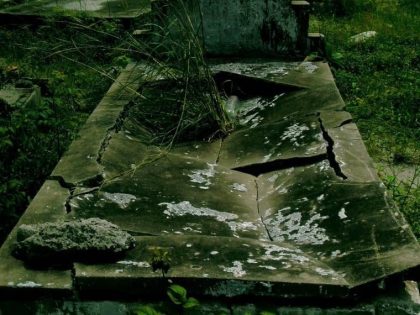Jour des morts
Comment le vol de cadavres au Gabon reflète la politique du pays.
Pour Aranud Esquerre, « les vivants ont modifié de manière inouïe leur rapport aux restes humains. » C’est sans doute à travers cette pensée que la réflexion que nous amorçons ici, appuyée par une enquête de terrain empirique à la fois passionnante et dangereuse, au cœur du pouvoir politique Gabonais en collusion avec le fétichisme, la sorcellerie que nous nous sommes immiscés. Cette dernière aboutit à un constat selon lequel, à chaque fois qu’une élection politique est en vue au Gabon, des tombes sont systématiquement profanées et pillées depuis octobre 2006.
Ce 2 novembre 2012, le cimetière de Mindoubé accueille du monde. Les membres des familles des défunts viennent pour le traditionnel nettoyage des tombes ou pour « passer du temps » avec les morts, comme on dit à Libreville. C’est le signe d’une société qui n’a pas rompu avec la mort comme dans la société postmortelle occidentale. Au Gabon, la fête de la Toussaint est une date importante, pendant laquelle les chrétiens commémorent la fête des saints et des défunts. D’origine catholique, cette célébration se caractérise par des messes de requiem et le traditionnel nettoyage des tombes dans les cimetières. Il s’agit d’un moment de communion avec les disparus et de la mise en exergue de la place des morts dans la vie sociale des vivants.

Ce 2 novembre cependant, des rixes éclatent ainsi que des cris d’indignation. Le motif de cette colère est que certains endroits du cimetière ont été rendus inaccessibles par le manque d’entretien, les eaux usées, et l’effondrement de la clôture. En effet, les cimetières à Libreville sont tous dans un état d’abandon extrême et sont parfois fermés au public. Certaines tombes sont littéralement ensevelies dans les hautes herbes. Ou bien la famille découvre que, faute de place, plusieurs morts ont été enterrés sur la même concession, une pratique courante à Libreville, où l’on parle d’enterrement « ascenseur ». Pis encore, les parents s’aperçoivent que des tombes ont été profanées. À quelques mètres de l’entrée du cimetière, une zone privilégiée par les profanateurs de tombes, Monsieur Mba découvre que le lieu de repos de sa sœur a été défoncé et pillé. Et surtout, la tombe de sa sœur a été vidée.
Selon mon enquête de terrain, c’est plus de cent cinquante tombes qui ont été vidé de leur contenu à Mindoubé entre 2009-2012. L’indifférence des pouvoirs publics contraste avec la colère, l’indignation et la frustration des parents des défunts rencontrés sur les lieux. Pourtant, le vol des morts n’est pas une question taboue au Gabon. Au contraire, c’est un phénomène social manifeste qui fait la « une » des journaux et du kongossa (rumeur) à Libreville, lesquels accusent généralement les hommes et femmes politiques, sénateurs, députés, ministres et autres officiels d’y être impliqués.
Dans cette économie du corps, du magique et du politique, les cimetières à Libreville et dans le reste du Gabon alimentent le marché occulte des restes humains. Ils sont devenus des sites d’extraction d’une « matière première » exceptionnelle que nous appelons « or blanc », au sein d’un vaste réseau de recyclage magique et thérapeutique du corps humain.

Pour finir, cet article part du pillage des morts, constaté lors de la Toussaint au Gabon, afin de mettre en exergue la nature et les mixes de tout genre qui structurent le système politique Bongo-PDG ; qui use du corps (mort et vivant) pour (sur)vivre. C’est un système politique nécrophage qui n’hésite pas à puiser sa force vitale dans la mort. Tout ceci suggère que le pouvoir politique Gabonais est en réalité le pouvoir souverain théorisé par Foucault.



